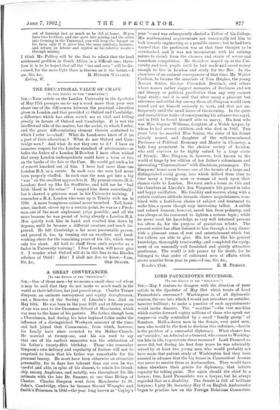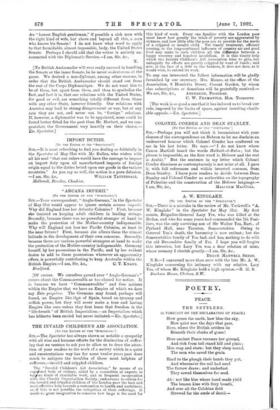LORD PAUNCEFOTE'S SUCCESSOR.
[To THE EDITOR OP THE "SPECTATOR.°J SIR,—May I venture to disagree with the direction of your article in the Spectator of May 31st which treats of Lord Pauncefote's successor ? Washington is, of all diplomatic centres, the one into which I would not introduce an outsider, however brilliant; to make a practice of such appointments would invite disaster. The " machine "—the vast machine which carries forward eighty millions of those who speak our tongue—is really controlled by a small " family group " of Senators. Half-a-dozen men in the Senate, very quiet men, men who would be the first to disclaim this influence,—herein is the problem of a successful diplomacy. What chance has an " outsider," an Admiral or a General, who comes to Washing- ton late in life, to penetrate these recesses ? Lord Pauncefote never did, but during his first four years he was admirably served by at least two young men who would probably not have made that patient study of Washington had they been assured in advance that the big house in Connecticut Avenue was never to receive them as Ambassadors. They would have taken elsewhere their genius for diplomacy, that infinite capacity for taking pains. Nor again should the chief be a lawyer; true, Lord Pauncefote was a lawyer, but he always regarded that as a disability. The Senate is full of brilliant lawyers ; I pity Mr•. Secretary Hay if an English Ambassador• began to practise law on the Foreign Relations Committee.
An " honest English gentleman," if possible a rich man with the right kind of wife, but above and beyond all this, a man who knows his Senate ! I do not know what word to apply to that formidable, almost impossible, body, the United States Senate. Perhaps I should add that the writer is entirely un- connected with the Diplomatic Service.—I am, Sir, &c., X.
[No British Ambassador will ever really succeed in handling the Senate or the inner Senate, be he never so dexterous at the game. We desired a non-diplomat, among other reasons. in order that the British Ambassador should stand out from the rest of the Corps Diplomatique. We do not want him to be of them, but apart from them, and thus to symbolise the fact, and fact it is, that our relations with the United States, for good or evil, are something totally different from those with any other State, however friendly. Our relations with America may lead to strong disagreement or war, but at any rate they are not, and never can be, "foreign" relations. If. however, a diplomatist was to be appointed, none could be found better fitted for the post than Mr. Herbert, and we con- gratulate the Government very heartily on their choice.— En. Spectator.]







































 Previous page
Previous page